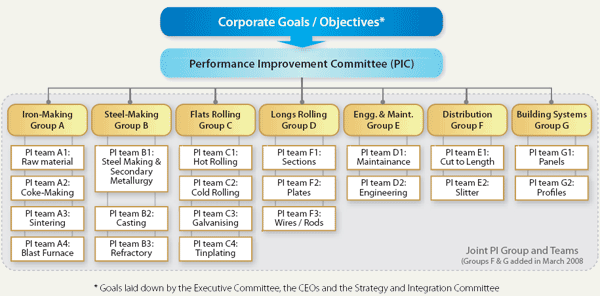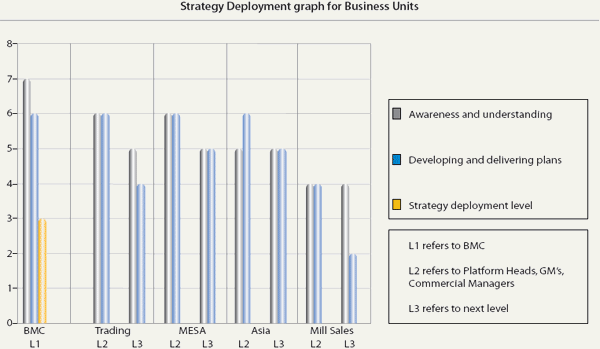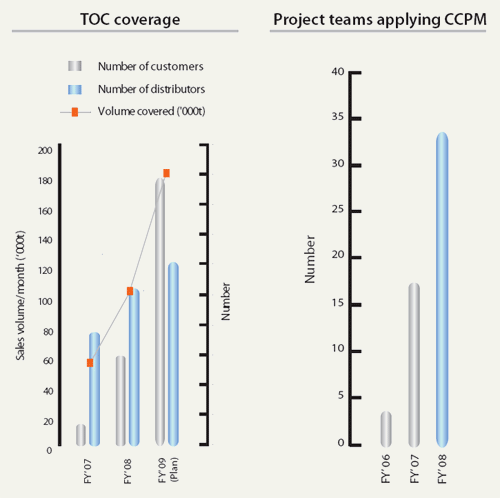Process Improvement – A continuing initiative
Over the years, Tata Steel has placed a continuous emphasis on improving processes, with a view to consistently increasing efficiencies, enhancing quality, and thereby achieving better performance benchmarks in all areas. The various initiatives taken by the several companies in its operations across the world have seen the development of several models, that have sustained over the years and have now become institutions. These initiatives typically have been designed to encompass in their fold all the people down the line, so that process improvement becomes a way of life.
Performance Improvement Teams
To leverage synergies between Tata Steel and Corus and
accelerate performance improvement through learning and
sharing, a Performance Improvement (PI) Committee has been
constituted. Under this committee 7 PI groups have started
functioning, identifying Key Performance Indicators (KPI’s) to be
improved and improvement projects to be undertaken across
various sites of the Tata Steel Group.
The formation of the Performance Improvement Committee (PIC), is part of systemising Process Improvement in the Tata Steel Group. Six new group chairs have been put in place for the key work areas. The group chairs will report on progress directly to the PIC. This will ensure that Continuous Improvement (CI) will become central to how the groups operate.
Initiatives in Europe
The emphasis of the CI activities in Tata Steel’s European
operations are focussed on providing Business Units (BUs)
with the tools and knowledge to be able to drive the business
forward under the banner of Continuous Improvement using
Lean Principles. During the year gone by, the focus has been
on transferring the knowledge and capabilities into line management and making the link between strategic delivery
and CI through a common Strategy Deployment process.


Lean Management
A workshop comprising all of the CI Managers from the
individual BU’s was organised. The objective was to understand
the kind of knowledge and skills that were required by line
managers to accelerate the rate of improvement. The output
of this, along with a summary of all training activities being
undertaken at BU level will now be centralised into a common
training programme.
Strategy Deployment
A Strategy Deployment process, backed by an established
standard was launched for all BUs. The standard describes what
a BU must have in place with regards to Strategy Deployment,
but does not dictate how these activities are carried out. A ‘How
To’ guide will be published in 2008 to help BU’s fill in knowledge
gaps. An audit of the process was also completed in all BU’s. All
BU’s are required to have auditors who participate in cross BU
audits. An audit score is produced and reported back to the BU
management team, with improvement opportunities. All BU’s
have a target of achieving an audit score of six in 2008-09.
Training
Continuous training is carried out for all CI coaches. Today,
approximately 450 coaches throughout Europe have been
trained. During 2007, a course was developed entitled ‘How to
Improve Flow’ – which was intended to help BU’s implement
the Theory of Constraints (TOC). Six different BU workshops
have also been run and many have attributed significant
increases in throughput and reductions in working capital due
to the knowledge gained in the workshops. Courses are also
held on strategy deployment to help BU’s in achieving the audit
target of six. The Corus courses have also been made available
to the wider Tata Group and Tetley will start sending attendees
this year.
Knowledge Sharing
Knowledge sharing is a fundamental cornerstone of CI and
a number of activities have been undertaken to improve
performance in this area. A bi-monthly newsletter called ‘Improving Corus’ has a wide circulation and contains information
regarding good practice and contact details for employees
to connect with others who have faced similar problems for
themselves. The CI Gateway has also been made more user
friendly. The vision for 2008-09 is to adopt a web based system
that is more searchable and will enable employees who are part
of CI to connect on a real time basis to share and learn. During
2007-08 many exchange visits have also taken place between
Corus and Tata Steel. There have been many examples of good
practice sharing and this will continue throughout 2008-09.
Corus is also participating in the European Network Forum
(ENF). This forum will initiate a number of special interest groups
open to all Tata enterprises and cover jects such as TBEM and
Innovation and will provide the platform for inter organisational
knowledge sharing.
TBEM
Many BU’s continue to assess how TBEM can be used to drive
business excellence. In order to facilitate the process, Ashorne
Hill Management College has been established as the European
centre for TBEM training. A number of courses have helped BU’s
understand the building blocks required to achieve business
excellence and how TBEM can help.
Initiatives in Indian Operations
ASPIRE T3 – The 3 Pronged approach
A strong improvement framework which supports a culture of
improvement has been put into place. ASPIRE is the Tata Steel
way of implementing improvements that are currently focussed
on three T’s (ASPIRE T3) which is an integration of 3 models : TOC (Theory of Constraints); TQM (Total Quality Management);
and Technology. ASPIRE T3 provides the platform for setting
aspirations and enabling breakthrough and continuous
improvements.
• Theory of Constraints (TOC):
The key objective is to develop a competitive edge based on
reliable delivery service and thereby create value for customers.
One of Tata Steel’s key initiatives, this provides more value to
customers while also improving realisations and share of
business with select customers and market segments.
This programme has 3 major components:
- Building and selling win-win market offers based on delivery service reliability.
- Building supply chain capability for reliable service.
- Building operational exploitation capability.
Tata Steel has so far rolled out two specific market offers based on this model:
- Pull based Replenishment offer for its distributors: Through
this model, the Company is able to cater to the final
customer needs in a proactive manner and is also able to
control its pricing structure on a real time basis, thereby
contributing to its bottom line.

- VMI offer for OEM customers: This helps ensure high availability to key customers. Customers are reciprocally sharing the gains with Tata Steel – in the form of lock-ins and even an increase in share of business.
- The Company plans to roll-out two more market offers in FY 2008-09 (Reliability and Rapid Response offer to customers for whom timely delivery is a critical success factor).
A robust back end supply chain redesign based on TOC buffer management principles and its implementation has helped in achieving a service reliability of over 83% (weighted month average of FY 2007-08 for FP, LP, Tube and Wire divisions) which is a benchmark in the steel industry.
Tata Steel adopted Critical Chain Project Management (CCPM – project management the TOC way) to plan and execute projects (maintenance and expansion) at the earliest within the limited means. In the past two and a half years Tata Steel has applied CCPM in more than 55 projects to complete projects 10% to 35% ahead of earlier planned schedule.
• Total Quality Management (TQM):
TQM provides the fundamental structure for customer and
quality focussed continuous improvements.
The key TQM elements as practised by the company are:
- Policy management – A structured strategy development and deployment process.
- Daily management – A structured methodology to carry out activities on a regular basis to attain the purpose of the job efficiently involving operating employees.
- Problem Solving and Task Achieving – A structured methodology for identifying root cause and solving major problems or accomplishing major tasks.
Tata Steel is planning to challenge the Deming Application Prize in FY 2008-09. This prestigious prize is presented by JUSE, Japan to a company that has achieved distinctive performance improvements through the application of TQM. Intensive preparations are underway with mock audits being conducted by external and internal auditors to identify areas for improvement. In the process, considerable improvements have been made in bringing about a process orientation across all levels in the organisation.
• Technology
The goal is to foster a technology mindset amongst a cross
section of employees. The ASPIRE T3 Knowledge Management
Programme - including Knowledge Manthan and Manthan
Ab Shop Floor Se - provides the platform. From FY 2006 to
FY 2008, 10650 employees have been engaged in the process
of knowledge creation and dissemination.
Process Improvement in South East Asia
NatSteel Asia has initiated process improvements in the past
and current financial years based on impact on operations.
The main thrust in improvements has been made in different areas, with a focussed intent of having quantifiable and measurable process improvements, with a resultant impact on productivity and efficiency.
At the Meltshop, the optimisation of oxygen Virtual Lancing Burners brought down EAF electricity consumption from 300-310 kWh/mt to below 290 kWh/mt. Through strategic sourcing, the Company saved S$326,000 from better purchasing of fuel oil, ferro-alloys, graphite electrodes and coke.
The establishment of activity-based Time Models for Mesh Welding Machines, together with data downloading led to improved production planning and productivity. Improved processes and machine capabilities enabled an increased capacity from 2,600 tonnes/month to 4,500 tonnes/month in BP Caging. In the area of logistics, a consultant study was implemented to better optimise finished goods space utilisation through alternative stacking methods and material handling systems.
The installation of a Global Position System for all prime movers enabled tracking of every delivery made to customers. In Total Operational Performance, the Company identified targeted savings of S$16 million/year across different departments and successfully implemented 99% of them to achieve a S$19 million of savings in FY 2007-08.
Process efficiency was achieved in Vietnam across Sales and Distribution. Improved product quality has resulted in the company being awarded the ISO Gold Cup by the Ministry of Science and Technology.
